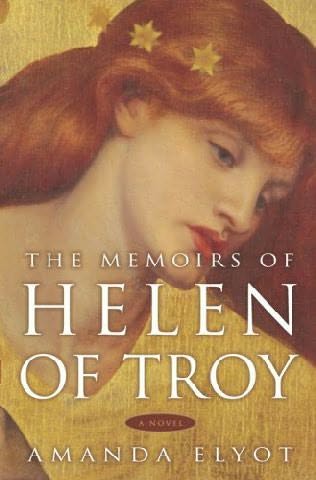The Memoirs Helen of Troy
by Amanda Elyot

Reviewed by Coral
Worried what her daughter, Hermione, will think of her, Helen writes the story of her life, from her divine birth, her first taste of love, her unhappy marriage to Menelaus, and her love of Paris that would throw the whole Greek world into chaos.
I have been having really bad luck with books lately, hitting a run of mediocre-to-bad books. Unfortunately, this was just another book to add to this list.
Considering that the book is heavily based on the Greek mythological source with Helen as Zeusí daughter and Paris winning the promise of Helenís love by judging Aphrodite as the most beautiful, I didnít really understand the Mother Goddess references/religion that was included in the book. It felt out of place in the universe of the book.
I know Helen is supposed to be the most beautiful woman in the world, but it is just disturbing to have people pointing that out when sheís eleven. Actually, Helenís age during a lot of what happens at the beginning of the story disturbed me.
Though I will admit that itís a part of the Helen myth, her kidnapping and subsequent relationship with Theseus has always bothered me; I am not particularly fond of the victim falls for her captor story line.
Unless I missed something Ė and I wasnít skimming the book Ė I found it weird how Helenís father, the kind of Sparta, just disappeared after she married Menelaus and he became king.
The buildup for the Helen and Paris love story is almost non-existent. Their relationship seemed to be more lust and divine promises than love, which didnít help me understand why Helen would run away and leave all her children behind.
Because the story is told from Helenís point of view, a lot of the other characters arenít really fleshed out. Agamemnon was a pretty one note villain, Achilles was just a brute on the battlefield and Patroclus was just the innocent carefree boy that Helen remembered from one meeting when her suitors gathered at Sparta.
For the characters to describe Cassandra as being cursed to have visions that wonít be believed just doesnít make any sense. Maybe in retrospect, but in the present time it would make more sense if they believed that Apollo cursed her with false visions.
In some respects the story was too much of a retelling of the myth. But the author did include two twists which I didnít really like, so this might be more of a ďthe author canít win for trying because I am too pickyĒ type of thing.
I agree with the opinion that Helen voices, that itís unfair that itís expected/acceptable when husbands cheat on their wives in her world yet when women cheat on their husbands they are vilified. But the other side of that is that I think itís then hypocritical for Helen to vilify the husbands who cheat when she herself left her husband and children to run off with another man.
The last complaint is really minor, but using Troyan instead of Trojan was just annoying.
Grade: F